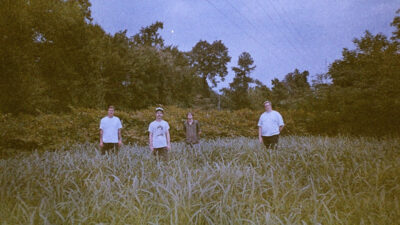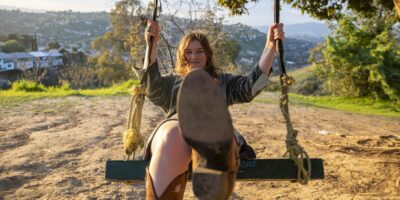The Goalie’s Anxiety at the Penalty Kick crept onto the scene in fall of 2020 with WAYS OF HEARING, a charming blend of slowcore, chamber pop, and emo; it was the soundtrack for many, many winter nights around that time—the perfect music for the early nights, the colder temperatures, the loneliness of that moment.
THE ILIAD AND THE ODYSSEY AND THE GOALIE’S ANXIETY AT THE PENALTY KICK, the band’s sophomore album, arrives nearly four years later in the middle of spring, its pastel cover a sharp contrast to the muted maroon of WAYS OF HEARING. THE ILIAD AND THE ODYSSEY is a bit lighter, a bit springier, than its predecessor—although the Philly septet hasn’t gone pop by any means. “I never touch an electric guitar on this record,” vocalist and guitarist Ben Curttright is quick to mention when we talk about the process that led to the album—a process that, it turns out, took nearly every minute since the day WAYS OF HEARING dropped.
“The first demos for what would become ILIAD, I did over winter break, December 2020 to January 2021—basically all our stuff so far has been written in those little gaps in the academic calendar, since I was teaching at the time and I really wasn’t good at making the time for music otherwise. I brought, like, seven songs to the band, and they’re more or less as you hear them on the record, at least structurally. Becky led writing on the other two songs—‘System of One’ and ‘Tightrope Walker,’ ‘Stranger in These Dark Times,’ if it matters—and I would say that, fortunately enough, everything was pretty much put together before I moved in 2022,” he tells me. Curttright and harpist Keely McAveney—who are engaged now—moved to Curttright’s native Nebraska after he got a job offer there, splitting the writing and recording of THE ILIAD. He traveled back to Philly in August of that year to record his parts, but the sessions were put on hold when he caught COVID.
“So we took a couple weeks off after that, and I installed the demo version of Logic on my laptop, and then, with Mark [Watter, engineer], like, coaching me on Zoom through where to put the microphones and stuff, did my guitars at home, and then he got the rest of the band into the studio over the course of the fall, and it got done, somehow. A lot of that was alchemy to me,” he says. He’s quick to note that “it speaks to the incredible dedication and talent of Mark, [engineers] Scoops [Dardaris and] Jasper [Boogaard], and everyone else in the band that this record even exists, much less that it sounds good.”
—
McAveney never left Omaha during the recording of THE ILIAD, tracking the harp in her home office. If there’s one thing The Goalie could change about the LP, Curttright shares, it’d be to add more harp: “Keely’s been playing for probably 15, 20 years now, in some capacity, and it’s just a sound you can’t get on any other instrument, and if you have an honest-to-God pedal harp at your house, and you’re recording an album, it seems like criminal negligence not to use it… We had a part written for ‘Mr. Settled Score’… but there was already too much going on in that song, so I don’t think we ever recorded it. Keely’s range is better represented on the tape she and I did last year. But I don’t think ‘First Time’ really worked as a song until she recorded her part in it, and I’m very grateful she was able to.”
One of the most interesting moments on the album is the seven-minute glockenspiel take on “Clair de Lune,” which the band approached the same way they approached McAveney’s harp parts: “If you have a concert glockenspiel player in your band, which Al [Resh, drummer] is, then I feel like you’re doing everyone a disservice by not letting them flex a bit.” Originally, he shares, “Clair de Lune” was considered as a hidden track on WAYS OF HEARING, but it just never materialized. It’s for the best this way—it’s a beautiful comedown for THE ILIAD, a simple and understated finale for a heartwrencher of an LP.
And THE ILIAD is a moving record—it’d be nearly impossible if it wasn’t, given how much violin and harp and bells are all over this thing. But a lot of it, too, comes from Curttright and keyboardist/vocalist Becky Hanno’s lyrics. Much of Curttright’s material concerns notions of home and comfort, appropriate for a record named after the great homecoming epic and partially recorded back in his home state. But that’s pure coincidence “because all my lyrics, even the super on-the-nose stuff in ‘Midwestern Home,’ were written before I’d even started to consider moving back.” Mostly, he says, it’s probably inspired more by COVID isolation than anything else. It was through that lens that he connected with Homer’s epic: “I feel like the pandemic isolation art I connected with during the pandemic was almost exclusively older stuff that was recontextualized by the circumstances in which the book or film or whatever was being experienced. It was my first time reading the ODYSSEY, embarrassingly, and I just felt like it was a perfect story in that moment, where you’re getting older, you feel like you’re missing chances to do the stuff you wanted to do with your life, and you’re all alone, being buffeted about by these powers that are so much greater than you that they don’t even realize how small you are.”
—
Curttright and Hanno share lead vocal duties throughout the LP, just as on WAYS OF HEARING, and bassist Michael Foster even gets a turn at the mic on “Mr. Settled Score.” Given the way the songwriting broke down, for a lot of the record, the songwriter often handed off the reins; “Wild Rose” and “April 25,” for example, were penned by Curttright but are primarily led by Hanno, as he felt her voice was a better fit for what’s going on around it. He sings on Hanno’s “System of One,” and notes that his experience was “to just follow along and help Becky make the song into what she was hearing in her head” and make it real.
The dual vocal approach helps give each song a unique character, particularly on this album, where the band stretches themselves a bit more. “System of One” is almost jaunty, and the second half of “Tightrope Walker / Stranger in These Dark Times” is as catchy as anything they’ve ever released. Even opener “Leaf,” which Curttright describes in self-deprecating fashion as “Bandcamp emo,” has a pop twist—its final 30 seconds introduce electronic jitters and allow him to spin an infectious melody before an abrupt cut.
Of course, songs like “First Time” and “Midwestern Home” tap into that same wintry energy that made WAYS OF HEARING so comforting. It’s an impressive example of a band tweaking their sound enough to show growth without losing what made them special in the first place. For his part, Curttright agrees: “ILIAD shows our range better because everyone had more room to try stuff. If you’ve never heard our stuff before, I don’t know. There are songs I love, like ‘Sunflower’ by Low or that second track on PYGMALION by Slowdive, where I’m, like, objectively this is a boring song, it’s just the same thing over and over again, but I also feel like it could go on forever and I’d be okay with it. ‘Lazy Eyelids’ by Carissa’s Wierd. You know. That’s the feeling I’m hoping to create.” He’s right about most of it, but there’s one glaring error. No one could ever call THE ILIAD AND THE ODYSSEY boring.
THE ILIAD AND THE ODYSSEY AND THE GOALIE’S ANXIETY AT THE PENALTY KICK is out now.
















Comments